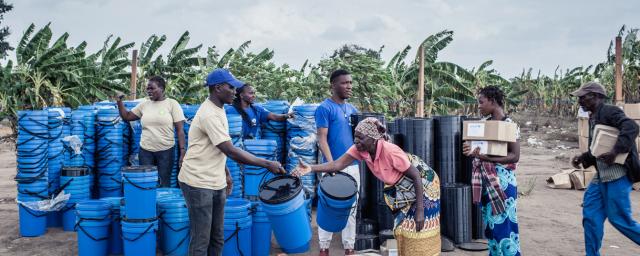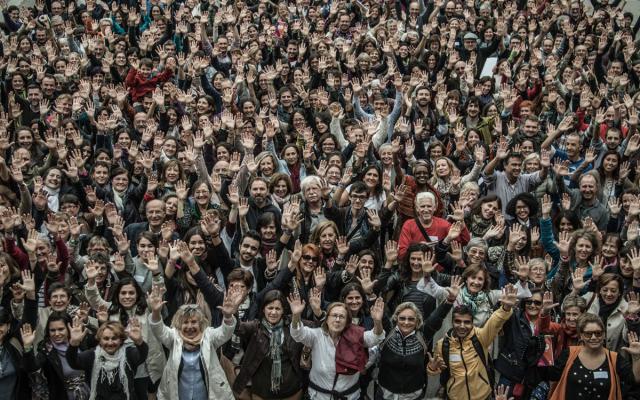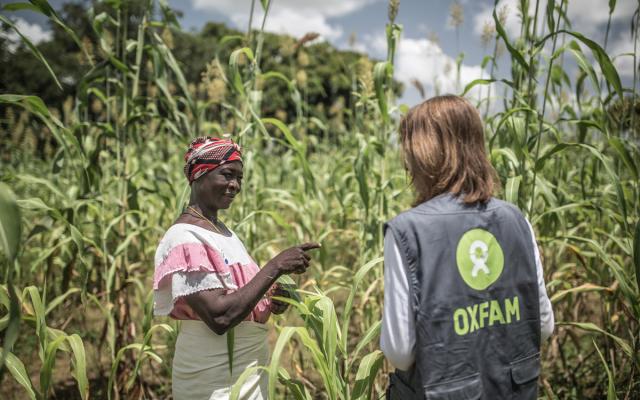
Oxfam staff distributing hygiene kits in Maxquiri Alto resettlement camp (Mozambique) as part of the Cyclone Idai emergency response activities. Around 3,000 people received the parcels during three days of the distribution. (Photo: Micas Mondlane/Oxfam)
We are a confederation
In 1995, a group of independent non-governmental organizations came together to share knowledge and resources and combine their efforts in the fight against poverty and injustice. They formed a foundation (“Stichting” in Dutch): Stichting Oxfam International knowing that by joining forces as a global confederation they could maximize efficiency, impact, and reach.
"Whereas conflicts, injustice, inequality and the denial of people’s basic rights are major causes of poverty, it is necessary to achieve reform, particularly by the empowerment of the poor. To this end, the objectives of the Foundation are:
- to relieve poverty, combat distress and alleviate suffering in any part of the world regardless of race, gender, creed or political convictions;
- to research the causes and effects of poverty, injustice and suffering;
- to inform the general public and decision-makers about the causes and possible solutions; and
- to work as an international partnership of goodwill."
Article 3 Stichting Oxfam International Constitution
Our affiliate family
There are currently 22 member organizations, our affiliates, who coordinate and lead this fight with the support of the Oxfam International Secretariat (OIS). Each affiliate is an independent organization with its own areas of activity and work contributing its own strengths and expertise to the confederation to achieve our shared goals. The foundation provides a medium to agree on which priorities and aims they hold in common, and how to achieve them. It also supports and makes possible affiliate collaboration on shared projects.
Current Oxfam affiliates
Oxfam America (USA), Oxfam Australia, Oxfam Belgium, Oxfam Brasil, Oxfam Canada, Oxfam Colombia, Oxfam Denmark , Oxfam France, Oxfam Germany, Oxfam GB, Oxfam Hong Kong, Oxfam India, Oxfam Intermón (Spain), Oxfam Ireland, Oxfam Italy, Oxfam Mexico, Oxfam Aotearoa (New Zealand), Oxfam Novib (Netherlands), Oxfam Pilipinas (Philippines), Oxfam Québec, Oxfam South Africa, and Kadın Emeğini Değerlendirme Vakfı (KEDV - Foundation for the Support of Women's Work, Turkey).
Public engagement offices
The Confederation also has two public engagement offices - in South Korea and Sweden - which concentrate on raising awareness and funds for our work.
New Affiliates
From time-to-time Oxfam International also welcomes outside organizations into our network with a view to becoming full affiliate members of the Confederation. By working closely together we can test our cooperation, consider our shared values, and whether we are a good fit for each other. Prospective Affiliates have the right to attend Affiliate Business Meetings (ABM) as a non-voting member and to send one participant to the OI Assembly as a voting Delegate. Prospective Affiliates are entitled to participate in any Oxfam communities of practice, platforms, and forums, including the specific right of the Prospective Affiliate’s Executive Director to attend the OI Executive Directors Forum (EDF) as a full member.
We are now on the road to welcome new affiliates in:
- The Pacific
- Senegal
- Kenya
- Indonesia
As part of our commitment to global balance and to developing Oxfam as a diversified network, we are working to grow the number of Oxfam affiliates in the Global South over the coming years.
Formed in 1995, the OIS agrees on priorities and shared aims, and supports collaboration in the confederation to maximize efficiency, impact, and global reach.
OIS manages Oxfam’s global influencing and campaigning agenda, along with country, cluster and regional development programs. OIS also manages the Global Humanitarian Team (GHT), which provides and develops technical support across the confederation and works in partnership with local civil society organizations on humanitarian responses to emergencies worldwide.
Headquarters and offices
The Secretariat is headquartered in Nairobi, where it is registered under a Host Country Agreement with the Government of Kenya. It is also registered as a foundation (Stichting) in the Netherlands and as an overseas company limited by guarantee in the United Kingdom.
The Secretariat has offices in strategic locations around the world that work to influence decision-makers to ensure their policies have a far-reaching, positive impact on those most in need. The regions are: Asia, MENA (Middle East and Africa ), Africa, and LAC (Latin America and the Carribean).
Our offices are in Addis Ababa, Brussels, Geneva, New York, and Washington DC.

Our people, our team
The Oxfam confederation as a whole employs 8,283 people.
This includes staff in the OIS offices, headquartered in Nairobi (with an office in Oxford, public engagement and advocacy offices); staff employed by our affiliates; staff in our country, cluster and regional offices; and the Global Humanitarian Team (GHT) – a team providing technical support and capacity building for humanitarian responses that includes rapidly deployable humanitarian support personnel.
At 31 March 2024, OIS employed 217 people.
We share office space, aims and values, working together over six continents, to build and benefit from each other’s strengths, bolster our efforts, and avoid duplication of work.
We are as diverse as we are inclusive, people from all backgrounds and walks of life who share aims and values and work together to make a better world.
Our Executive Director
With more than 27 years of experience as a civil society leader, Amitabh Behar has made valuable contributions to Oxfam’s global transformation process since joining Oxfam India in 2018. He has been widely recognized for his work on people-centric advocacy, governance accountability, social and economic equality, and citizen participation.
Prior to Oxfam, Amitabh was the Executive Director of the National Foundation for India and Co-Chair of the Global Call to Action Against Poverty. He has also previously served as the Vice-Chair of the Board of CIVICUS, and Board Chair of Amnesty International India.
He currently serves on the boards of several other organizations, including the Centre for Budget and Governance Accountability, an Indian public policy think-tank.
Our governance
In July 2021, Oxfam International adopted a global governance architecture with three components: an International Board, which meets quarterly; a multi-stakeholder Assembly, meeting every two years; and Affiliate Business Meetings that are convened by the International Board at least once a year.
This architecture emerged from an extensive reform process initiated in 2017 to reflect our continued commitment to strengthening global balance, share power and to bring diversity of voice and feminist leadership to our governing bodies. It was driven by the desire to strengthen accountability and transparency and to become a more relevant, resilient and impactful organization into the future.
International Board
The International Board is composed of 11 members: five independent members (with no formal association with Oxfam, including the OI Chair and Treasurer) and six members who also serve on the boards of national Oxfam affiliates. Seven of the members are women and six are from the Global South. The Board’s role includes: overseeing the implementation of Oxfam’s Global Strategic Framework; overseeing the OI Secretariat and appointing the OI Executive Director; and overseeing global finance and risk.
Global Assembly
The Global Assembly is made up of delegates from Oxfam affiliates and external stakeholder representatives from the countries and regions in which Oxfam works, each with a vote. It approves Oxfam’s global strategy, the profile and competency framework for the Board, and the appointment of new Board members; and establishes general principles and frameworks for policies with global application.
Affiliate Business Meetings
Affiliate Business Meetings will be convened as required and is a space in which Affiliates collectively agree on matters that will directly or indirectly impact on their individual legal and fiduciary obligations. Composed of Affiliate representatives, it decides on matters relating to constitutional amendments, financial contributions from affiliates to the global organization, and the admission of new Oxfam affiliates, amongst others.

We have a responsibility to our donors, partners, allies, supporters, staff and volunteers, regulatory bodies and, in particular, the communities with whom we work. Not just in principle but in practice as we constantly evaluate our work learn how to do things better next time. We share our findings and support our partners in building their own robust systems to monitor, evaluate, and learn.
To find out more about accountability, and safeguarding and transparency at Oxfam you can find our accountability reports in the key documents section below.

